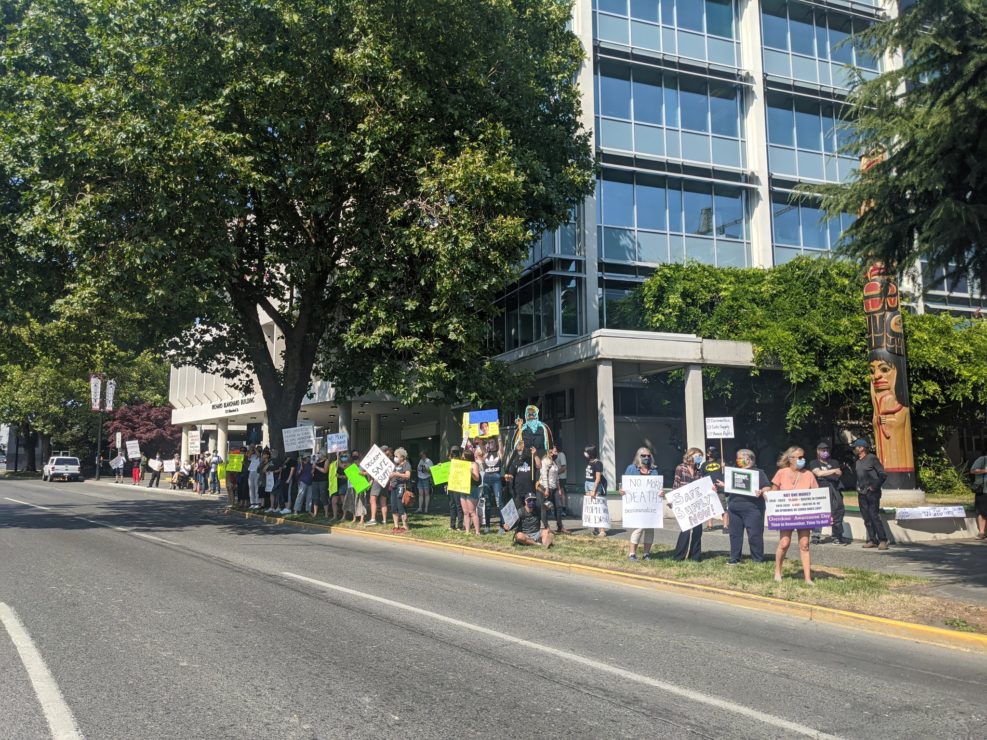As B.C. grapples with ongoing overdose crisis, over 50 supporters rallied in front of the Ministry of Health offices

This article discusses drug overdose and addiction. Please be advised that this subject matter may be difficult and traumatic for some readers.
On July 31, amid chants of “decrim now,” cowbells, and cars honking in support, over 50 supporters gathered in front of the Ministry of Health office to raise awareness for the escalating overdose crisis in B.C.. The rally began the lead up to International Overdose Awareness Day on August 31st — an international event meant to bring attention to the ongoing overdose crisis and reduce stigma surrounding drug addiction.
Some signs at the rally had pictures of loved ones lost, which served as a stark reminder of the people and families behind the overdose statistics. The South Island Community Overdose Response Network and Moms Stop the Harm organized the rally.
One of the moms organizing the event, Jenny Howard, has a personal connection to the cause. Her son Robby died of an overdose in 2016. Since then, Howard has been advocating alongside other moms and family members that have lost loved ones. The group has been a source of support for her, and Howard says they won’t be backing down anytime soon.
“Historically, moms have been a powerful force to be reckoned with.”
“I’ve lost my son, but I continue to advocate for another mother’s son because I know what that phone call meant for me that night and I can’t imagine another family going through that,” Howard says. “These are preventable deaths.”
In both May and June, B.C. saw a record number of overdose deaths. In May, 171 people died of overdose in B.C. — shattering the previous record of 161 overdose deaths in a single month from December 2016 — while June recorded 175 deaths in the province. The overdose crisis was declared a public health emergency in April 2016, right after Howard lost her son.
Now, amid COVID-19, safe consumption sites and other addiction support services have closed, moved, or turned to a mobile system. The effort to abide by COVID-19 restrictions disrupted serves, leading people to use alone and seek out alternative, and more dangerous, suppliers. In Victoria, the largest safe consumption site, The Harbour, moved to mobile service delivery amid COVID-19. AIDS Vancouver Island closed their Johnson Street office. They supported people living in Topaz Park and are now operating in the Comfort Inn. Both the Comfort Inn and Save on Foods Memorial Centre have overdose prevention and addiction services on site. The Native Friendship Centre, a seasonal shelter, was also forced to close. Just 30 hours afterwards, one of their former residents died of an overdose.
A press release indicated two specific aims for the rally, both of which relate to B.C.’s Police Act.
Citing Provincial Health Officer Dr. Bonnie Henry’s report Stopping the Harm, the groups asked that the B.C. government “set broad provincial priorities with respect to people who use drugs.” This would seek to destigmatize and decriminalize drug users, and shift how policing approaches people who use drugs.
Their second call asked that the government develop a new regulation under the Police Act that would prevent police from using their resources on simple possession charges.
“This would essentially prevent members from using police resources, including member time, on investigations, searches, seizures, citations, arrests, and/or detentions that relate solely to actual or alleged violations of simple possession,” Henry’s report says.
Amid calls from the Black Lives Matter movement of systemic racism and lacking accountability for policing in the province, B.C. Premier John Horgan called for a review of the Police Act in June.
Horgan also penned a letter to Prime Minister Justin Trudeau and asked him to decriminalize the possession of drugs at the federal level, citing that B.C.’s life expectancy rate has gone down because of the sheer number of overdoses in the province.
Horgan says decriminalizing possession would “reduce the systemic stigma associated with illicit drug use and support people to access the services that they need to stay safe and start their path to recovery.”
When asked about Horgan’s proposal, Trudeau indicated that he did not support decriminalization.
Speaking to VICE, Gillian Kolla, a postdoctoral research fellow at the Canadian Institute for Substance Use Research, University of Victoria, said Horgan could make changes to the policing act and effectively implement decriminalization.
At the rally in front of the Ministry of Health, chants of “not one more death,” had a sense of urgency. For people that use drugs, Howard says the stigma is likely preventing urgent action from taking place.
“When we see the government response to the pandemic, and then we see the lack of response to individuals who struggle… we are not going to be silent,” Howard adds. “It’s inexcusable that we are losing Canadians — 5.5 British Columbians per day — to this crisis.”
“We need compassion from our political leaders, we need action, and we need support. Families are not feeling that way and drug users are not feeling that way.”







